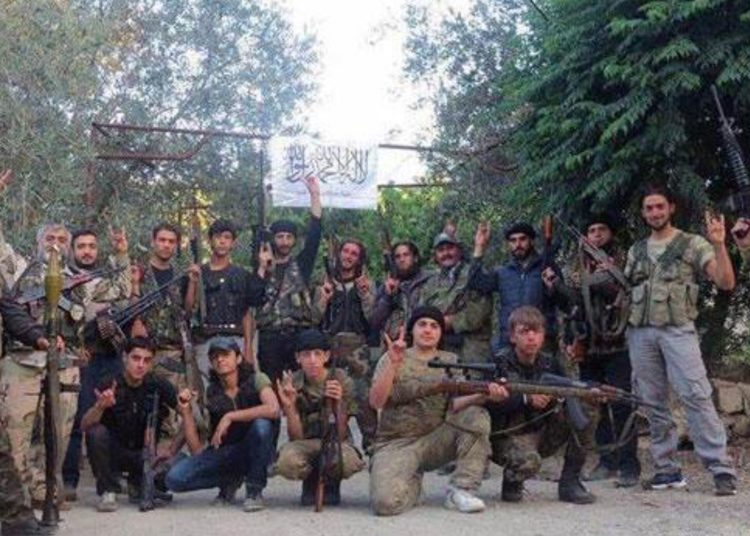Abdullah Bozkurt/Stockholm
Turkish intelligence agency MIT planned and executed the brutal murder of a Russian pilot who survived the downing of a Russian SU-24 jet over Turkish-Syrian border area in 2015, and the killer was an MIT agent, according to a revelation made by a former Turkish officer.
Turkish nationalist/Islamist militant Alparslan Çelik, the alleged killer of one of the pilots of the downed Russian jet, was in fact an agent of MIT, said former staff major Engin Büker, who now lives in Europe.
Çelik was working as a field commander and coordinator in a jihadist group that was under the full control of MIT in Syria’s northwestern city of Azaz when the Russian pilot who parachuted from the plane was murdered, Büker claimed in a series of posts on Twitter on January 16.
“The man who was talking loudly on the speakerphone and saying, ‘Praise to God, we ripped his [the pilot’s] head off’ was Alparslan Çelik,,” Büker said.
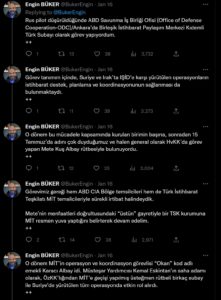
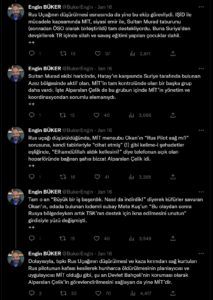
At the time, Büker was working at the Joint Intelligence Sharing Center (Birleşik İstihbarat Paylaşım Merkezi) in Ankara, which was established to coordinate intelligence between Turkish and American officials as part of the US-led coalition to defeat the Islamic State in Iraq and Syria (ISIS).
The center was set up in the Turkish capital at the Office of Defense Cooperation Turkey (ODC-T), which functions as part of the US Security Assistance Organization to Turkey. Büker was a senior liaison officer on the Turkish team.
As part of his job, Büker had been in contact with both the Central Intelligence Agency (CIA) and MIT. He confirmed that MIT’s clandestine operations in Syria with jihadist groups were overseen by deputy intelligence chief Kemal Eskintan, a former soldier who has been the head of the Department for Special Operations (Özel Faaliyetler Dairesi) at MIT since 2014.
Eskintan was assisted by a man Büker identified only by his nom de guerre, Okan, a former colonel from the Land Forces Command and Eskintan’s right-hand man. Okan was in charge of all field operations in Syria, answering only to Eskintan, and Çelik was working under Okan as one of the jihadist commanders on the ground.
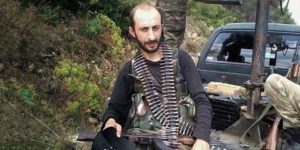
Büker recalled the mood in the ODC-T coordination office when Okan was told on the phone by Çelik how the the murder of the Russian pilot had evolved. Okan was upbeat about what he described as a great job in killing the Russian pilot and taking down the Russian plane. However, others in the room were quite uneasy about the fallout from such an incident and possible repercussions for the Turkish military.
Büker’s expose of Çelik’s MIT identity confirms a leaked audio recording that was posted on YouTube in June 2021 by journalist Ahmet Nesin that showed Çelik admitting to fact that he had worked for the Turkish state when he organized the assault on the downed Russian pilot and was involved in the killing of Russian combat pilot Maj. Rumyantsev Sergei Aleksandrovich
The recording, which captured a conversation between Çelik and a Turkish woman named Ilgın Şentürk, a close acquaintance, also revealed how the Turkish government used jihadist militants like Çelik to fuel the Syrian civil war and protected him from legal troubles back in Turkey when he was on the run from the law.
In the phone conversation, Çelik expressed no remorse for what he had done and appeared to have accepted imprisonment as an obligation to the Turkish state after intensified Russian pressure on the government of President Recep Tayyip Erdoğan. His imprisonment was brief, however. Today, he serves in the protective detail of Erdoğan ally Devlet Bahçeli, the leader of the far-right Nationalist Movement Party (MHP).
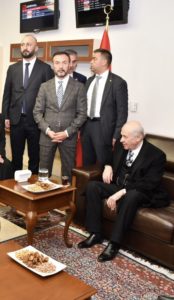
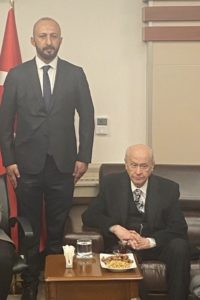
Nordic Monitor previously published a report that confirmed a Turkish fighter jet pilot knew he was shooting at a Russian Sukhoi Su-24M warplane in airspace over the Turkish-Syrian border area when he was ordered to fire by the commander of the Air Force, Gen. Abidin Ünal, with the approval of the government. Hulusi Akar, the then-chief of general staff and current defense minister, personally met and congratulated the combat pilot of the F-16 fighter jet who had shot down the Russian jet.
In the recording Çelik said he anticipated his arrest after video footage that implicated him in the murder of the pilot in Syria was published in the media. He was bragging about how he had taken part in jihad in Syria and had maintained good relations with Turkish officials.
Çelik was groomed in the ülkücü (nationalist/idealist) ideology that was promoted by the racist MHP. His father Ramazan was mayor of Keban for years after winning elections on the MHP ticket. In an interview with the Turkish media in 2014, his father said he was proud of his son and that he, too, was willing to go to Syria to fight if needed.
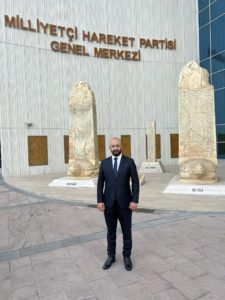
Confirming what many already believed, Çelik admitted on the phone that he was protected by prosecutors in Izmir, led by then-Chief Public Prosecutor Okan Bato and Counterterrorism and Organized Crime Bureau prosecutor Berkant Karakaya, both loyalists of President Erdoğan, who had hand-picked them for the job.
“My troubles could have been much worse if they had not protected me,” he added.
“[Prosecutor Karakaya] is a Turkish nationalist who protected me. I liked him very much. We sat down and chatted many times. He protected me,” Çelik said.
In fact, the original charges against Çelik for the killing of the Russian pilot were quickly dismissed by Karakaya, who claimed there was no evidence supporting the criminal prosecution of Çelik for the murder.
Only after pressure from Russia began mounting on the Turkish government and Moscow started revealing President Erdoğan’s family’s dealings with ISIS in the illegal oil trafficking business was Çelik detained again on charges that had nothing to do with the murder of the Russian pilot.
In addition to the legal cover provided by the prosecutors, Çelik and his partners in crime were also closely involved with intelligence, police department and ruling party officials in Izmir in running a major racketeering ring. Not only did they traffic fighters and arms to Syria but also ran organized crime activities in Izmir and threatened and blackmailed businesspeople to extort money, seize their assets and take over their businesses.
The phone conversation provided clues as to who in the Turkish government was involved in schemes to blackmail businesspeople in malicious prosecutions. Gürbüz Yüksel, the then-regional head of MIT in Izmir; Kudret Dikmen, head of the intelligence department of the Izmir police; and prosecutors Bato and Karakaya were ringleaders running the racketeering scheme in Izmir.
According to Çelik and Şentürk, senior political figures like former Prime Minister Binali Yıldırım, former deputy chair of the ruling Justice and Development Party (AKP) Nükhet Hotar and the Turkish president’s son-in-law Berat Albayrak were part of the racketeering scheme and provided political cover for officials and militants in Izmir province.
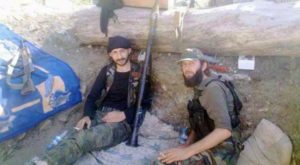
Some of the illegal schemes run in the province were previously disclosed by Serkan Kurtuluş, Şentürk’s boyfriend and Çelik’s comrade-in-arms in Syria. Kurtuluş, who had to flee Turkey for fear of assassination after internal squabbles in the organized crime network, spilled the beans on his former accomplices from Argentina, where he was held in detention. Turkey has been trying to get Kurtuluş extradited from there.
He spoke to multiple media outlets including US Fox News revealing the details of how the group seized the assets of government critics from the Gülen movement, a group that is opposed to the Erdoğan government and critical of the Turkish government’s aiding and abetting of armed jihadist groups. He also exposed a plot to kill American pastor Andrew Brunson, who was wrongfully jailed in Turkey before former US president Donald Trump intervened in securing his release and return to the US. The Erdoğan government had planned to pin the assassination on the Gülen group if Kurtuluş had gone through with the murder.
Kurtuluş was also in Syria to fight along with Çelik. In the phone recording Şentürk confirmed that her boyfriend did everything with the approval and knowledge of MIT regional director Gürbüz. Çelik claimed police intelligence chief Dikmen, described as the right-hand man of Interior Minister Süleyman Soylu, also used Kurtuluş for his own schemes.
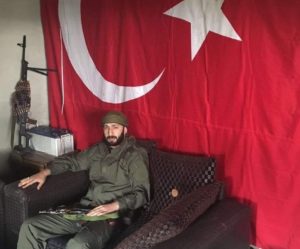
The criminal investigation into Çelik was initially dropped by Izmir prosecutor Karakaya after a one-and-a-half month inquiry in May 2016. Karakaya claimed that the autopsy report of the Russian pilot indicated that in addition to four gunshot wounds, he had fractures in his skull and that this could have resulted from a hit to the glass roof of the cockpit as he was ejected from the downed plane and might have led to his death. He also claimed that the video footage showed that Çelik was instructing his men to not shoot but rather take the pilot hostage, although he later admitted that he ordered them to fire and was responsible for the behavior of his men as their commander.
The prosecutor’s reasoning contradicted the video recordings that showed the moments Çelik and his men were shooting at the parachuting pilots. In a comment to the Turkish press right after the incident, he admitted he and his men took shots at the pilots and that they were killed in the air. He said he had already warned Russia and other sponsors of the Bashar al-Assad regime of consequences, adding that the incident was proof that he and his militia were determined to go through with their threats against Russian and Syrian government forces.
Prosecutor Karakaya, a friend of Çelik, thought he had saved his buddy from legal troubles by dropping the probe. This was not the first time Çelik had managed to remain free of legal troubles. Turkish authorities knew Çelik was a criminal and did not do anything. Before going to Syria, he was convicted on counterfeit money charges and sentenced to two-and-a-half years in prison. He escaped from a prison in Niğde province.
Although he was a convicted felon and a fugitive, Çelik was traveling at will in Turkey, moving back and forth over the Turkish-Syrian border. He even gave an interview to a national daily, bragging about his fight in Syria against the Russians and asking for more sophisticated weapons such as anti-aircraft artillery for the fight. He said he had no fear of the Russians.
However, as the Russian government’s pressure started to build on the Erdoğan government to do something about Çelik and the revelation of the ISIS oil schemes that involved Erdoğan’s family, things changed for Çelik.
He was detained by the police on an anonymous tip on March 31, 2016 along with his men in a restaurant on charges of possessing illegal and unlicensed firearms. The detention was in response to the Russian government’s pressure on the Erdoğan government.
In June 2016 the judge ordered his release pending the conclusion of his trial on firearms violations. However, he remained in jail on separate charges. He was convicted of firearms violations in May 2017 and sentenced to five years in prison. Freed again from jail in December 2020, Çelik continues to serve for Turkish intelligence, this time as a bodyguard for the far-right nationalist leader.

